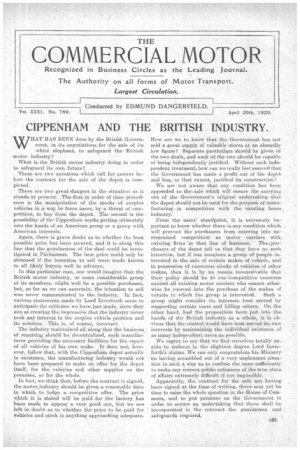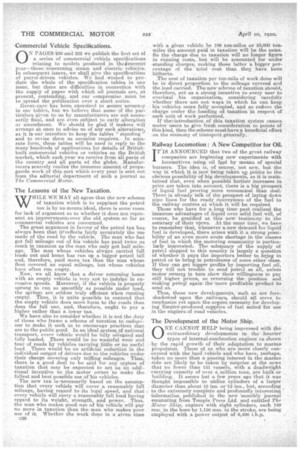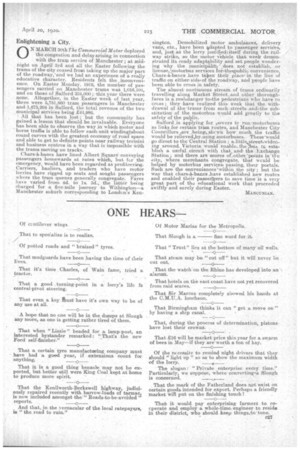CIPPENHAM AND THE BRITISH INDUSTRY.
Page 1

Page 2

Page 3

If you've noticed an error in this article please click here to report it so we can fix it.
WHAT HAS BEEN done by the British Governroeut, in its negotiations,for the sale of its white elephant, to safeguard the !British motor industry ?
What is the British motor industry doing in order to safeguard its own future ?_ Those are two questions which call for answer before the contract for the sale of the depot is comple•ted.
There are two great dangers in the situation as it stands at present. The first in order of time precedence is the manipulation of the stocks of surplus vehicles in a way to force users, by a threat of competition, to buy from the depot. .The second is the possibility of the Cippenham works getting ultimately into the hands of an American group or a group with, American interests.
Again, there is grave doubt as to whether the best possible price has been secured, and it is along this line that the genuineness of the deal could be investigated in Parliament. The best price could only be obtained if the intention to sell were made known to all likely buyers well in advance.
In this Particular ease, one would imagine, that the British motor industry, or some considerable group. ofits members, might well be -a possible purchaser, but, so far as we can ascertain, the intention to sell was never coamnunicated to the industry. In fact, various statements made by Lard Inverforth seem to anticipate the criticism we have just made, sin& they aim at creating the impressiim that the industry never took any interest in the surplus vehicle problem and its solution. This is, of course, incorrect. .
The industry maintained all along that the business of repairing should be decentralized, each manufacturer proViding the necessary facilities for the repair of all vehicles of his own make. It does not, however, follow that, with the Cippenham depot actually in existence, the manufacturing industry would not have been prepared to make an offer for the depot itself, for the vehicles and other supplies on the premises, or for the. whole. , • In fact, we think that, before the contract is signed, the motor industry should be given a reasonable time in which to lodge a competitive offer. The price which it is stated will he paid for the factory has been made to appear a very good one, but we are left in 'doubt as to whether the price to be paid for 'vehicles and stank is anything approaching adequate: How are we to know that the Government has not sold a great supply of valuable stores at an absurdly low figure? Separate particulars should be given of the two -deals, and each of the two should be capable of being independently justified. Without. such intle,pendent treatment, how can we really feel assured that the Government has made a profit out of the depot and has, to that extent, justified its construction?
We are not aware that any condition has been appended to the sale which will ensure the carrying out of the Government's original .undertaking that the depot should not be used for the purpose of manufacturing in competition with the existing home industry.
Froth the users' standpoint, it is .extremely important to know whether there is any condition which will Prevent the purchasers from entering into unrestrained competition . as motor carriers with existing firms in that line of business. Thel:,purchasers of the depot tell us that they have no such intention, but if one imagines a group of people interested in the, sale of certain makes of vehicle, and in possession of enormous stocks of vehicles of other makes, then it is by no means inconceivable that their policy should be to run (competitive concerns against all existing motor carriers whocannot otherwise be coerced into the purchase of the makes of vehicle in which the group is interested. Such a group might consider its interests best served by supporting certain users and killing others, On the other hand, had the proposition been put into the hands of the British industry as a whole, it is obvious that the control would have -best served its own interests by maintaining the individual existence of as. many independent users as passible.
We regret to say that we find ourselves totally unable to endorse in the slightest degree LOrd Inverforth's claims. We can only congratulate his Ministry on having scrambled, out of a very unpleasant situation in suA 4 Way as to confuse the issue sufficiently to make any correct public estimates of the true state of affairs extremely difficult if not impossible.
Apparently, the contract for the sale not having been signed at the time of writing, there may yet be time to raise the whole question in the House of Commons, and to put pressure on the Government in order to secure an undertaking that there shall be incorporated in the contract the guarantees and safeguards required. • Commercial Vehicle Specifications,
ON PAGES 230 and 232 we publish the first set of a series of commercial vehicle specifications relating to models produced in thekurrent year—those :concerning steam and electric vehicles: in subsequent issues, we shall give the specifications of petrol-driven vehicles. We had wished to pro dude the whole of the specification tables in one issue, but there are difficulties in connection with the supply of paper with which all journals are, at present, contending, and our compromise must be to spread the publication over a short series. Great care has been exercised to secure accuracy in our tables, but we believe that some of the particulars 'given to us by manufacturers are not necessarily final, and are even subject to early alteration oe amendment. We should be glad if makers will arrange it once to advise us of any such alterations, as it isour intention'to keep the tables "" standing" and to revise them as occasion requires. In separate form, these tables will be used in reply to the many hundreds of applications for details of British built commercial vehicles or vehicles on the British market, which each year we receive from all parts of the country and all parts of the globe. 141anufacturers scarcely realize the immense amount of propaganda work of this sort which every year is sent out frean the editorial department of slid' a journal as The Comr"dreiat Motor.
The Lessons of the New Taxation.
WHILE FfILE WE MAY all agree that the new scheme of taxation which is to supplant the petrol tax is by no means ideal, there is some room for lack of argument as to whether it does not represent an improvement-sever the old system so far as
commercial vehicles are concerned. • The great argument in favour of the petrol tax has • always been that ittrefleets fairly accurately the use made of the road by the vehicle. The man who has got full mileage out of his vehicle has paid twice as much in taxation as the man who only got half mileage. The man whose vehicles always carried full loath out and home has run up a higgei petrol bill and, therefore, paid more tax than the man whose fleet oovered an equal mileage, but whose vehicles have often run empty. Now, we all know that a driver returning home with an empty vehicle is very ark to indulge in excessive speeds. Moreover, if the vehicle is properly sprung to run as smoothly as possible under load, the springs are seldom truly efficient when running empty. Thu-s, it is quite possible to contend that the empty vehicle does more harm to the roads than does the full one, and, therefore, ought to pay a higher rather than a lower tax. . We have also to consider whether it is not the duty _
of those who frame. a scheme of taxation to -endeavour to make it such as to encourage practices that are to the public good'. In an ideal system of national transport, every vehicle would be fully occupied and fully loaded. _There would be no wasteful wear and tear of roads by vehicles carrying little or no useful load. There would be no artificial reduction in the individual output of drivers due to the vehicles under their charge covering only trifling mileages. Thus, there is a good deal to be said for any syetem of taxation that may be .expected to actas an midi.
• tional incentive to the motor owner to make the fullest and best possible use othis vehicles.
The new tax is=necessarily based on the assumption that every vehicle will cover a reasonably fun mileage, having regard to its legal speed, and that t every vehicle will carry a reasonably full load having regard to its weight, strength, and power. Thus, the man who makes good use of his vehicle will pay no more in taxation than the man who makes poor use of it. Whether the work done in a given time with a given vehicle be 100 ton-miles or 10,000 tunmiles the amount paid in taxation will be the same. Se the charge due to taxation will no longer figure in running costs, but will be accounted for under -standing charges, making these latter a bigger percentage of the total cost than they have been
hitherto. .
;The cost of taxation per ton-mile of work -done will be in direct proportion to themileage covered and the load carried. Thenew scheme of taxation should, therefore, act as a strong incentive to every user to overhaul -his organization, considering 'carefully whether there are not -ways in which he can keep his vehicles more fully occupied, and so reduce the charge under the, •heading of taxation in respect of each unit of work performed. . If theqintrodu.ction of this taxation system causes motor users to give fresh consideration to points of this kind, then the scheme must have a beneficial effect on the economy of transport generally.
Railway Locomotion : A New Competitor for Oil.
IT-IS ANNOUNCED that two of the great railway -companies are beginning new experiments with locomotives, using oil fuel by means of special burners. The idea is, of course, not new, but the way in which it is now being taken no points to the obvious possibilitYof big developments, as it is maintained that, even when possible further increases in price are taken into account, there is a big prospect of liquid. feel Proving more economical than coal. There is already talk of the prospect of lasing down pipe lines for the ready Conveyance of the fuel to the railway centres at which it will be required. Those who have for a long time past realized the immense advantages of liquid over solid fuel will, of course, be gratified at this new testimony to the accuracy of their views. At the same time, we have to remember that, Whenever a. new demand for liquid fuel is developed, there arises with it a strong passibility of an even more acute shortage in the classes of fuel in which the motoring community is particularly interested. The sadetquaey of the supplyof petrel shipped to this country is largely a question of whether it pays the importers better to bring in petrol or to bring in petroleums of some other class. If they can get bigger profits by importing fuel oil, they will not trouble to send petrol at all, unless motor owner§ in turn show their willingness to pay still higher prices, so reversing the position and making petrol again the -more profitable product to send us.
Thus, these new developments, such as are foreshadowerdi -upon the railways), should all serve to emphasize yet again the urgent necessity for developing Empire-produced supPlies of fuel suited for use in the engines of road vehicles.
The Development of the Motor Ship. .
ONE CANNOT HELP being impressed with the extraordinary developments in the heavier typos of internal-combustion engines as shown by the rapid growth of their adaptation to marine propulsion. Those of us who a-re more closely concerned with the land -vehicle and who have, perhaps, taken no more than a passing interest in the Marine side are likely to be taken by surprise at the news that no fewer than 151 vessels, with a deadweight carrying capacity of over a million tons, are built or building. It seems lant a few years ago that it was thonght impossible to utilize cylinders of a larger diameter than about 10 ins. or -12 ins., but, according e to the extremely Complete and profoundly interesting information, published in the new 'monthly journal emanating from Temple Press Ltd. and entitled The Motor Ship, engines with eight cylinders, each 740 ram. in the bore by 1,150 mm. in the stroke, are being employed with a power output of 6,400 i.h.p.
Enlightening a City. .
0 N MARCH 30th The Commercial Motor deplored the congestion and delay arising in connection with the tram service Of Manchester ; at midnight on April -3rd and all the Easter following the trains of the city ceased from taking up the major part of the roadwa,y,'and we had an experience of a really educative character. Residents felt the :inconvenience. On Easter Monday. 1919, the number of passengers carried on Manchester trams was 1,016,104, and on those of Salford 334,000 ; this year there were none. Altogether, in the Easter week of last year, there were 5,751,860 tram passengers in Manchester and-1,675,204 in Salford, the total revenue of the two municipal services being 24-4,986. ' All that has been lost ; but the community has gained a lesson that should be invaluable. Everyone has been able to observe the way iri which motor and horse traffic is able to follow ea& 'unit windingabout round curves with the greatest economy of road space and able to get to definite points near railway termini and business centres in a. way that is impossible With the trains moving on tracks. , Chars-banes have lined Albert Square conveying passengers homewards at rates which, but far the emergency, would have been regarded as profiteering. Carriers, hauliers, and traders who have motor lorries have rigged up seats and sought passengers where the tram queues generally congTegate. Fares have varied from 4d. to is. 3d., the latter being charged for a five-mile journey to Withington—a Manchester suburb corresponding to Londcm s Ken sington. Demobilized motor ambulances, delivery vans, etc., have been vlapted to passenger serviCes, and, just aa the lorry Justifiedatself during the railway strike, so the motor vehicle that, week demonstrated its ready adaptability and set people wondering why the municipalits ',does, not establish, or licerise,7motorb.us services fonthespublic convenience. Chars-illbancehave talten their place, in the line of traffic on either. side,of the roadway, and people have been able to cross in safety.
The almost continuous stream of trains ordinarily travelling. along Market Street ,and other thoroughfares is a. realtdanger tosthe pedestrians who have to crass ; they -have realized this week that, the withdrawal of the-trams from such streas and.ithe substitution, of the motorbus would add greatly to the safety of the public. Salford_is applying for powers to run:motorbuses as links for certain tram routes, and Manchester City Councillors are ;beinge.she.svn how much the traffic would be refieved,by,using motorbuses. -These•Would go direct to the'Central Station ; alittlestreet-widen around,.Victoria would enable., the ;bus to establish a useful, circuit with that., and' the :Exchange Station; and there art scores oflother 'points in'the city, wbere merchants congregate, that wculd be helped by motorbus services, passing, their portals. Such are the eonveniences'within the city.; but the way that charse4-bancs ,have established new routes and enabled their passeirgers to save time is a very great part of the educational work that proceeded swiftly and surely during Easter. MANCUNIAN.




























